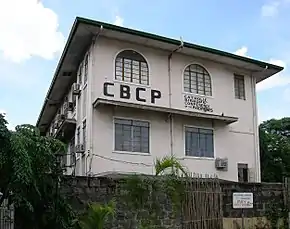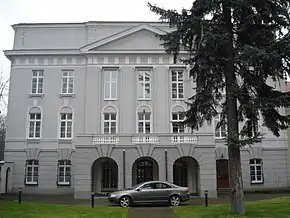Episcopal conference
An episcopal conference, sometimes called a conference of bishops, is an official assembly of the bishops of the Catholic Church in a given territory. Episcopal conferences have long existed as informal entities. The first assembly of bishops to meet regularly, with its own legal structure and ecclesial leadership function, is the Swiss Bishops' Conference, which was founded in 1863.[1] More than forty episcopal conferences existed before the Second Vatican Council.[2] Their status was confirmed by the Second Vatican Council[3] and further defined by Pope Paul VI's 1966 motu proprio, Ecclesiae sanctae.[4][5]
 |
| Part of a series on the |
| Canon law of the Catholic Church |
|---|
|
|
Episcopal conferences are generally defined by geographic borders, often national ones, with all the bishops in a given country belonging to the same conference, although they may also include neighboring countries. Certain authority and tasks are assigned to episcopal conferences, particularly with regard to setting the liturgical norms for the Mass. Episcopal conferences receive their authority under universal law or particular mandates. In certain circumstances, as defined by canon law, the decisions of an episcopal conference are subject to ratification from the Holy See. Individual bishops do not relinquish their immediate authority for the governance of their respective dioceses to the conference.[6]
Theological and juridical status
The operation, authority, and responsibilities of episcopal conferences are currently governed by the 1983 Code of Canon Law (see especially canons 447–459)[7][8] In addition, there are assemblies of bishops which include the bishops of different rites in a nation, both Eastern Catholic and Latin Catholic; these are described in canon 322 §2 of the Code of Canons of the Eastern Churches.
The nature of episcopal conferences, and their magisterial authority in particular, was subsequently clarified by Pope John Paul II in his 1998 motu proprio, Apostolos suos, which stated that the declarations of such conferences "constitute authentic magisterium" when approved unanimously by the conference; otherwise the conference must achieve a two-thirds majority and seek the recognitio, that is, recognition of approval, of the Holy See, which they will not receive if the majority "is not substantial".[9]
In the 2013 apostolic exhortation, Evangelii Gaudium, Pope Francis expressed his concern that the intent of the Second Vatican Council, which would give episcopal conferences "genuine doctrinal authority, has not yet been sufficiently elaborated."[10] On September 9, 2017, Pope Francis modified canon law, granting episcopal conferences specific authority "to faithfully prepare … approve and publish the liturgical books for the regions for which they are responsible after the confirmation of the Apostolic See." The Congregation for Divine Worship and the Discipline of the Sacraments, which formerly had primary responsibility for translations, was ordered to "help the Episcopal Conferences to fulfil their task."[11][12] On October 22, 2017, the Holy See released a letter that Pope Francis had sent to the Prefect of the Congregation for Divine Worship and the Discipline of the Sacraments, Cardinal Robert Sarah, clarifying that the Holy See and its departments would have only limited authority to confirm liturgical translations recognized by a local episcopal conference.[13] In late February, 2018, the Council of Cardinals and Pope Francis undertook a consideration of the theological status of episcopal conferences, re-reading Pope John Paul II's Apostolos Suos in the light of Pope Francis's Evangelii Gaudium.[14]
List of episcopal conferences
Africa
- Episcopal Conference of Angola and São Tomé
- Episcopal Conference of Benin
- Conference of Bishops of Burkina Faso and of Niger
- Conference of Catholic Bishops of Burundi
- National Episcopal Conference of Cameroon
- Central African Episcopal Conference
- Episcopal Conference of Chad
- Episcopal Conference of the Congo
- Episcopal Conference of the Democratic Republic of the Congo
- Episcopal Conference of the Côte d'Ivoire
- Episcopal Conference of Equatorial Guinea
- Assembly of Catholic Hierarchs of Ethiopia and Eritrea
- Episcopal Conference of Gabon
- Inter-territorial Catholic Bishops' Conference of The Gambia and Sierra Leone
- Ghana Bishops' Conference
- Episcopal Conference of Guinea
- Episcopal Conference of the Indian Ocean
- Kenya Conference of Catholic Bishops
- Lesotho Catholic Bishops' Conference
- Catholic Bishops' Conference of Liberia
- Episcopal Conference of Madagascar
- Episcopal Conference of Malawi
- Episcopal Conference of Mali
- Episcopal Conference of Mozambique
- Namibian Catholic Bishops' Conference
- Catholic Bishops' Conference of Nigeria
- Regional Episcopal Conference of North Africa[16]
- Conference of Catholic Bishops of Rwanda
- Conference of Bishops of Senegal, Mauritania, Cape Verde, and Guinea Bissau
- Southern African Catholic Bishops' Conference (SACBC)[17]
- Sudan Catholic Bishops' Conference
- Tanzania Episcopal Conference
- Episcopal Conference of Togo
- Uganda Episcopal Conference
- Zambia Episcopal Conference
- Zimbabwe Catholic Bishops' Conference
Asia

- Conference of the Latin Bishops of the Arab Regions
- Catholic Bishops' Conference of Bangladesh
- Chinese Regional Bishops' Conference
- Conference of Catholic Bishops of India (CCBI)
- Bishops' Conference of Indonesia (KWI)
- Catholic Bishops' Conference of Japan
- Conference of Catholic Bishops of Kazakhstan
- Catholic Bishops' Conference of Korea
- Episcopal Conference of Laos and Cambodia
- Catholic Bishops' Conference of Malaysia, Singapore and Brunei (CBCMSB)
- Catholic Bishops' Conference of Myanmar
- Catholic Bishops' Conference of Pakistan
- Catholic Bishops' Conference of the Philippines
- Catholic Bishops' Conference of Thailand
- Episcopal Conference of Turkey
- Catholic Bishops' Conference of Sri Lanka
- Catholic Bishops' Conference of Vietnam
Europe

- Episcopal Conference of Albania
- Austrian Bishops' Conference
- Conference of Catholic Bishops of Belarus
- Episcopal Conference of Belgium
- Bishops' Conference of Bosnia and Herzegovina
- Episcopal Conference of Bulgaria
- Croatian Bishops' Conference
- Czech Bishops' Conference
- Catholic Bishops' Conference of England and Wales
- Bishops' Conference of France (CEF)
- German Bishops' Conference
- Holy Synod of Catholic Bishops of Greece
- Catholic Bishops' Conference of Hungary
- Irish Catholic Bishops' Conference
- Italian Episcopal Conference (CEI)
- Latvian Bishops' Conference
- Lithuanian Bishops' Conference
- Maltese Episcopal Conference
- Bishops' Conference of the Netherlands
- Polish Episcopal Conference
- Portuguese Episcopal Conference
- Romanian Episcopal Conference
- Conference of Catholic Bishops of the Russian Federation
- International Bishops' Conference of Saints Cyril and Methodius (called "Bishops' Conference of the Federal Republic of Yugoslavia" between 1997[18][19] and 2005.[20] Includes the bishops of Serbia, Montenegro, Kosovo, and Macedonia.)
- Bishops' Conference of Yugoslavia (1918—1993)
- Scandinavian Bishops Conference (includes the bishops of Denmark, Finland, Iceland, Norway and Sweden)
- Bishops' Conference of Scotland
- Conference of Slovak Bishops
- Slovenian Bishops' Conference
- Spanish Episcopal Conference
- Swiss Bishops Conference
- Ukrainian Episcopal Conference
Oceania
- Australian Catholic Bishops Conference
- New Zealand Catholic Bishops' Conference
- Episcopal Conference of the Pacific (C.E. PAC.)[21]
- Catholic Bishops' Conference of Papua New Guinea and Solomon Islands
North America

- Antilles Episcopal Conference
- Canadian Conference of Catholic Bishops (CCCB)
- Episcopal Conference of Costa Rica
- Conference of Catholic Bishops of Cuba
- Conference of the Dominican Episcopate (CED)
- Episcopal Conference of El Salvador
- Episcopal Conference of Guatemala
- Episcopal Conference of Haiti
- Episcopal Conference of Honduras
- Conference of the Mexican Episcopate (CEM)
- Episcopal Conference of Nicaragua
- Episcopal Conference of Panama
- Puerto Rican Episcopal Conference (CEP)
- United States Conference of Catholic Bishops (USCCB)[22]
South America
- Argentine Episcopal Conference (CEA)
- Bolivian Episcopal Conference
- National Conference of Bishops of Brazil (CNBB)
- Episcopal Conference of Chile (CECh)
- Episcopal Conference of Colombia
- Ecuadorian Episcopal Conference
- Paraguayan Episcopal Conference
- Peruvian Episcopal Conference
- Episcopal Conference of Uruguay
- Venezuelan Episcopal Conference
Other episcopal bodies
In addition to the episcopal conferences as defined by the Holy See, there are a number of other regional groupings of bishops:[15]:1101–06
Synods of eastern rite churches
Synods of Bishops of the Patriarchal and Major Archiepiscopal Churches
- Synod of the Armenian Catholic Church
- Synod of the Chaldean Church
- Synod of the Catholic Coptic Church
- Synod of the Greek-Catholic Ukrainian Church
- Synod of the Greek-Melkite Catholic Church
- Synod of the Romanian Church
- Synod of the Syrian Catholic Church
- Synod of the Syro-Malabarese Church
- Synod of the Syro-Malankarese Church
- Council of the Ethiopian Church
- Council of the Ruthenian Church, U.S.A.
- Council of the Slovakian Church
Assemblies of bishops
National assemblies of Hierarchs of Churches Sui Iuris (including eastern Catholic as well as Latin ordinaries)
- Assembly of the Catholic Hierarchy of Egypt
- Assembly of the Catholic Bishops of Iraq
- Assembly of the Patriarchs and Bishops of Lebanon
- Assembly of the Catholic Hierarchs of Syria
- Assembly of the Catholic Ordinaries of the Holy Land
- Iranian Episcopal Conference
- Catholic Bishops' Conference of India (CBCI)
International Meetings of Episcopal Conferences
- Council of Catholic Patriarchs of the East
- Symposium of Episcopal Conferences of Africa and Madagascar
- Regional Episcopal Conference of Francophone West Africa
- Association of Episcopal Conferences of Central Africa
- Association of Episcopal Conferences of the Region of Central Africa
- Association of Member Episcopal Conferences in Eastern Africa
- Inter-Regional Meeting of Bishops of Southern Africa
- Reunion of Episcopal Conferences of West Africa
- Federation of Asian Bishops' Conferences
- Federation of Catholic Bishops' Conferences of Oceania (FCBCO)
- Council of European Bishops' Conferences (CCEE)
- Commission of the Bishops' Conferences of the European Community (COMECE)
- Latin American Episcopal Council (CELAM)
- Episcopal Secretariate of Central America and Panama
See also
References
- Histoire: Les origines de la CES: première expérience au monde d'une conférence épiscopale nationale (in French), Fribourg: Service de presse de la Conférence des évêques suisses, retrieved 6 March 2018
- McAleese, Mary (2012), Quo Vadis?: Collegiality in the Code of Canon Law (Kindle ed.), Blackrock, Ireland: The Columba Press, locations 2463-2466, ISBN 978-1-85607-786-6
- Christus Dominus: Decree Concerning the Pastoral Office of Bishops in the Church, 28 October 1965, §36–38, retrieved 7 March 2018
- Ecclesiae sanctae, 6 August 1966, retrieved 7 March 2018
- The Limits of the Papacy, p. 97, by Patrick Granfield, Crossroad, New York, 1987. ISBN 0-8245-0839-4
- John Paul II (21 May 1998), Apostolos suos; On the Theological and Juridical Nature of Episcopal Conferences, Vatican City: Libreria Editrice Vaticana, §19, retrieved 7 March 2018
- Code of Canon Law, 1983, §447-459, retrieved 5 March 2018
- John Paul II (21 May 1998), Apostolos suos; On the Theological and Juridical Nature of Episcopal Conferences, Vatican City: Libreria Editrice Vaticana, §5, retrieved 5 March 2018
- John Paul II (21 May 1998), Apostolos suos; On the Theological and Juridical Nature of Episcopal Conferences, Vatican City: Libreria Editrice Vaticana, §22, retrieved 25 June 2015
- Francis (2013), Evangelii Gaudium (PDF), Vatican City: Libreria Editrice Vaticana, §32, retrieved 28 Feb 2018,
The Second Vatican Council stated that, like the ancient patriarchal Churches, episcopal conferences are in a position 'to contribute in many and fruitful ways to the concrete realization of the collegial spirit'. Yet this desire has not been fully realized, since a juridical status of episcopal conferences which would see them as subjects of specific attributions, including genuine doctrinal authority, has not yet been sufficiently elaborated.
- Francis (9 September 2017), Magnum Principium (Motu Proprio), Vatican City: Libreria Editrice Vaticana, retrieved 13 March 2018
- Horowitz, Jason (9 Sep 2017), "Pope Francis Shifts Power From Rome With 'Hugely Important' Liturgical Reform", New York Times
- Wooden, Cindy (22 Oct 2017), In letter to Cardinal Sarah, pope clarifies new translation norms, Catholic News Service, retrieved 1 March 2018
- Briefing by the Director of the Holy See Press Office, Greg Burke, on the 23rd meeting of the Council of Cardinals with the Holy Father Francis, 28.02.2018, Vatican City: Holy See Press Office, 28 Feb 2018, retrieved 1 March 2018
- Annuario Pontificio per l'anno 2010 [Annuario Pontificio of 2010]. Vatican City: Libreria Editrice Vaticana. 2010.
- The Regional Episcopal Conference of North Africa includes the bishops of Algeria, Libya, Morocco, and Tunisia.
- The Southern African Catholic Bishops' Conference includes the bishops of South Africa, Botswana, and Swaziland.
- "UTEMELJENA BISKUPSKA KONFERENCIJA SR JUGOSLAVIJE" [Bishop's Conference of FR Yugoslavia Established]. Catholic Press Agency, Zagreb. 17 December 1997. Retrieved 13 October 2014.
- "Priopćenje za javnost". International Bishops' Conference of Sts. Cyril and St. Methodius. 10 April 2008. Retrieved 13 October 2014.
- "XIII. plenarno zasjedanje BK Srbije i Crne Gore" [13th Plenary Meeting of the Bishops' Conference of Serbia and Montenegro]. Catholic Press Agency, Zagreb. 21 January 2005. Retrieved 13 October 2014.
- The Episcopal Conference of the Pacific is made up of the bishops of Cook Islands, Fiji, French Polynesia, Kiribati, Marshall Islands, Micronesia, New Caledonia, Palau, Samoa, Tonga, Tuvalu, Vanuatu, Wallis and Futuna, and three U.S. dependencies (U.S. Commonwealth of the Northern Mariana Islands, U.S. Territory of American Samoa, and U.S. Territory of Guam). Conferentia Episcopalis Pacifici (C.E. PAC.). GCatholic website. Retrieved 2011-02-13.
- The United States Conference of Catholic Bishops includes the bishop of the U.S. Territory of the Virgin Islands, but not the bishops of the U.S. Commonwealth of Puerto Rico and the three U.S. dependencies in the Pacific (U.S. Commonwealth of the Northern Mariana Islands, U.S. Territory of American Samoa, and U.S. Territory of Guam).
Further reading
- Sullivan, Francis (2002), "The Teaching Authority of Episcopal Conferences" (PDF), Theological Studies, 63 (3): 472–493
External links
- List of all episcopal conferences by Giga-Catholic Information
- The Hierarchy of the Catholic Church by David M. Cheney